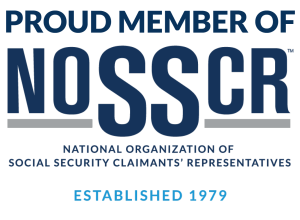We are still here for you. We know that many of you are at-risk and we want to keep you safe. We want to keep doing our work to help you with as little interruption as possible. At present, we are trying to meet with most clients over the phone, and masking-up if we need to meet in person. We are capable of doing all of our regular work for you. You may also contact us by text or email, if you are not able to reach us by phone.
All of our local Social Security offices are open but closed to the public, except by appointment. Online services and services over the phone are still available. Please rest assured that all of your business with Social Security can be accomplished by these means, and we are here to help.
Hearings are now being rescheduled to avoid in-person contact. Because of this, claimants will be given a choice of a) waiting for an in-person hearing (and it could be many months) or b) having a phone hearing at your scheduled time without delays. For years, we have had the philosophy that justice is best served in person and have traveled four hours round-trip to hearings in Spokane because we believed it was best for our clients. However, because the wait for an in-person hearing may be very long, we encourage clients to agree to phone hearings and we will do our very best to make these work. Video hearings may become an option in the near future (through a platform similar to Zoom).
